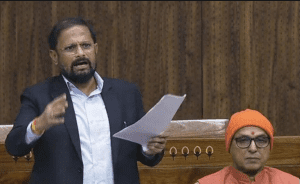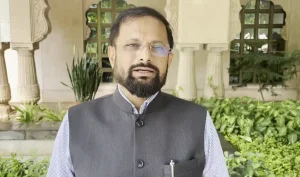‘Saffron Terror’ Narrative Driven by Minority Appeasement, Claims Shiv Sena MP
In a remark that has stirred debate across political circles, Shiv Sena MP Naresh Mhaske has alleged that the narrative around so-called “Saffron terror” is nothing but a deliberate propaganda tool designed to appease minority communities and discredit nationalist ideologies. His comments come at a time when discussions on communal politics and the use of sensitive narratives in political discourse have resurfaced nationally.
Speaking to reporters recently, Naresh Mhaske asserted that attempts to link “Saffron terror” with Hindu groups were not only factually unfounded but also politically motivated. “The propaganda of ‘Saffron terror’ was never about truth. It was always about vote-bank politics — to keep minorities scared and consolidated and to paint nationalistic movements in a bad light,” he claimed.
Revisiting an old controversy
The term “Saffron terror” first entered mainstream political discourse over a decade ago, after several terror cases were allegedly linked to radical fringe elements professing Hindu nationalist ideology. Critics argue that while the cases were serious, the phrase was used loosely, often unfairly extending blame to larger cultural and religious movements.
Mhaske, a vocal Shiv Sena parliamentarian from Maharashtra, highlighted that several high-profile cases failed to end in convictions, and in some instances, the accused were acquitted. “When the judicial process itself could not find conclusive proof, how can political parties and media houses continue to peddle this narrative?” he questioned.
Appeasement politics at the centre of allegation
According to Mhaske, the continued use of terms like “Saffron terror” serves a strategic political purpose. “It’s an attempt to scare minorities into believing that the majority community is inherently violent,” he said, adding that this fear is then exploited to consolidate minority votes.
“The narrative damages not just those falsely accused, but it also creates deep divisions in society,” Mhaske argued. He claimed such propaganda is detrimental to India’s democratic and pluralistic ethos, where communities should ideally coexist rather than be set against each other for electoral gain.
A polarising statement
Predictably, Mhaske’s comments have drawn sharp reactions. Several opposition leaders dismissed his remarks as an attempt to deflect attention from genuine concerns about rising communal polarisation in the country. “Calling it propaganda doesn’t change the fact that there have been extremist elements across communities,” a senior leader from an opposition party said.
Others accused Mhaske and his party of attempting to rewrite history to fit a political agenda. However, supporters of Mhaske argue that the MP is raising a legitimate concern — that political labels can unfairly stigmatise entire groups and undermine social cohesion.
Context and timing
The timing of the statement is notable. It comes amidst heated discussions in the media and Parliament on communal rhetoric, the misuse of sensitive narratives, and the role of political parties in either calming or exacerbating social tensions.
Shiv Sena, historically known for its regional nationalism and later its more pronounced alignment with Hindutva politics, has in recent years taken a stronger stance on what it sees as misrepresentation of Hindu groups. Mhaske’s remarks fit into this broader ideological positioning.
The role of media and public discourse
Mhaske also directed part of his criticism at the media, accusing some outlets of giving disproportionate coverage to the idea of “Saffron terror” without equal scrutiny of extremist acts allegedly linked to other communities. “This selective outrage erodes trust in journalism and fuels more division,” he said.
A call for balanced dialogue
Despite the charged tone of his statement, Mhaske concluded by saying that India needs an honest conversation about extremism that transcends political convenience. “All forms of violence must be condemned unequivocally. But branding an entire cultural identity with the term ‘terror’ is deeply unjust,” he said.

He urged political parties, civil society, and the media to “look beyond narrow electoral gains” and engage in dialogue that focuses on real threats to national security, rather than narratives crafted for short-term advantage.
Looking forward
Whether Mhaske’s comments spark a deeper debate or remain just another headline in the larger political narrative remains to be seen. But his intervention has certainly reopened an old and sensitive chapter in India’s complex relationship between religion, politics and national security.

